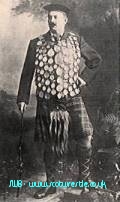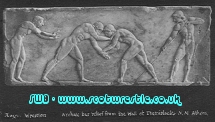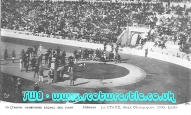The
Scottish Wrestler |
of the Century 1 |
| International Styles | |||
| Scottish wrestlers were very active when modern international wrestling began to develop. Most sporting competitions in the early 19th century were for money prizes or side-stakes and when the amateur sports movement began these wrestlers were excluded. Basically they were excluded because they were too good, the bourgeoisie who did not wish to compete against artisans dominated the amateur movement. They felt that apart from the strength developed by manual labour to compete against manual workers would be socially demeaning. | |||
| At the first modern Olympic Games in Athens in 1896 only five wrestlers competed and the standard was poor. All the good wrestlers were at that period either professional or working class and could not afford to travel to Greece; an example is an Italian athlete his country’s only entrant. This poor fellow walked all the way from Milan to compete only to be ruled out when he arrived because he was a professional. Typical of the snobbery of the period, a French sprinter insisted on wearing white gloves because he was competing before royalty. The great Donald Dinnie of Scotland although in his late fifties would probably have won between six and eight of the silver medals presented to the champions had he been allowed to enter. However one Scotsman did compete in the first wrestling event of the modern Olympic Games, Launceston Elliot | |||
| Launceston Elliot had no problems with social position; he was a cousin of the Earl of Minto. Elliot was a competent Catch-as-catch-can wrestler at amateur level but above all he was a weightlifter and has a unique place in the history of modern sport, he was the first Olympic weightlifting champion. Elliot won a gold and a silver medal for weightlifting and his participation gave Scotland an important record in the history of modern sport. Scotland was represented in two sports at the birth of the modern Olympic movement, a representation which is all the more interesting in that highland games were largely responsible for Baron De Coubertin’s inspiration. | |||
| Wrestling at the ancient Olympics was more akin to Catch-as-catch-can style but French wrestling had by the late 1890s adopted the name Greco-Roman and was enormously popular in Europe. It was inevitable that Greco-Roman would be chosen as the first Olympic style and when Elliot stepped into the ring to wrestle another Olympic Champion, tiny Carl Schuhmann of Berlin, it looked like a mismatch. | |||
| Schuhmann a product of the German Turner movement had already won three gold medals for gymnastics and the giant Scotsman will not be the last strongman to find that skill and agility are more important in wrestling than mere ponderous strength. Carl Schuhmann won another gold medal and Elliot placed fourth. | |||
| Donald Dinnie (1837/1916) from the highland village of Balnacraig near Aboyne was without doubt the most successful Scots wrestler of the 19th century. Among his many feats he won more than 11,000 competitions in throwing and weightlifting plus 2,000 wrestling matches in different styles all over the world. During a period of 30 years he dominated world sport in the strength events. David Webster has just written a biography of him and the book is compulsive reading. A previous book by David, ‘Scottish Highland Games’ was described in a review in the Glasgow Herald in 1973 as, “The most important book on Scottish sport ever written.” Anyone who is interested in highland games, traditional Scottish sport and the beginnings of modern international wrestling has heard of the great Donald Dinnie, no modern athlete has ever been so honoured as Dinnie was. Many of his medals and the belt awarded to him by the people of Great Britain are in Aberdeen City Museum, but who is the greatest Scottish wrestler of the 20th century? | |||
|
|
| © Copyright 2000 - 2009 Scottish
Wrestling Bond © Website Designed &
Maintained By: Davie McGinn |



